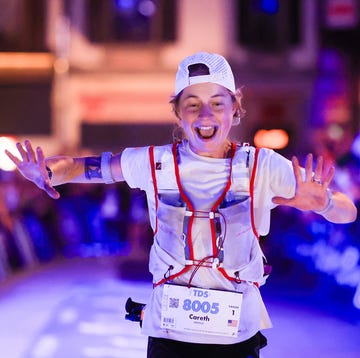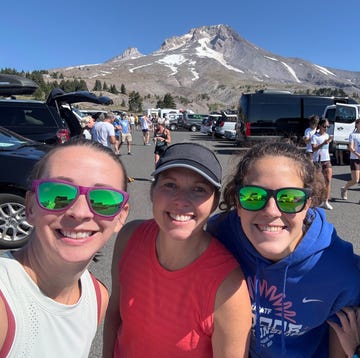Alec Basten was smiling. He had just finished 12th in the final of the 3,000-meter steeplechase at the USATF Championships—third to last—but proud of his effort.
He was smiling because last summer, he couldn’t run two miles without stopping to use the bathroom. His gastrointestinal system was a wreck. In August, it came to a boiling point, and Basten was hospitalized with a spiked fever. Emergency room imagery showed he had an autoimmune condition: ulcerative colitis, a chronic bowel disease.
Recovery was slow. While there’s no cure for ulcerative colitis, he eventually dialed in a cocktail of meds to keep his flare-ups at bay, but it took him until the late fall to get back to consistent milage. A month after introducing some tempo runs to his training, Basten was finishing up a session when he tripped on a stick and heard a pop. He skidded across the ground at Forest Park in St. Louis and laid there. A stranger had to call him an Uber back to his house. He’d broken the cuboid bone in his foot.
Doctors put him in a boot, which he wore for about two months. The setbacks felt relentless, and looking back, Basten isn’t entirely sure how he ended up toeing the line in Eugene, Oregon, on Saturday.
“Winter Alec was hoping that he was going to be able to run and enjoy it again,” he told Runner’s World after his race. “I wasn’t sure at that point if I was ever going to be able to run competitively.”
A comeback story
Throughout the medical complications, Basten, 27, was undergoing a lot of change in his personal life, too. He moved to St. Louis to pursue his doctorate in physical therapy at Washington University in St. Louis, which arguably has the top program in the country. In December, he got engaged to his partner, Abby Kohut-Jackson, also an elite steeplechaser. He also parted ways with the Under Armour Mission Run Baltimore Distance team, although he stayed with his coach, former professional steeplechaser Cory Leslie.
Leslie recruited Basten to Baltimore after Basten finished his college career at the University of Minnesota, where he was a multiple-time All-American on the track, highlighted by a runner-up finish in the steeplechase at the 2022 NCAA Championships. Leslie was, and is, drawn to Basten’s toughness—something he feels is especially important in the steeplechase.
“He’s an absolute gamer,” Leslie said of Basten. “He’s able to kind of dig in and do things that most people can’t.”
At the beginning of the season, Leslie thought that a good goal for Basten would be to simply qualify for the U.S. Championships. Basten took his first stab at the 8:43.00 minimum qualifying mark at Track Fest on May 24. He was nervous going into the race and ran 8:52.63, his slowest time since 2018 (his sophomore year of college). But his next race was a huge step forward: A 8:28.23 at the Sunset Tour in Los Angeles on July 12.
The time was fast enough to qualify him for the 30-person field at USAs. Before the meet, Basten inked a short-term deal with Bandit Running’s Unsponsored Project, which supports a cohort of unsigned athletes with unbranded black kits and $1,500 in cash.
In his preliminary round, Basten was the last athlete to advance to the final, qualifying on time. Or “by the skin of his teeth,” as Leslie put it.
Basten thought on a good day in the final, he could nab his highest ever finish at USAs, which was 10th from the 2021 Olympic Trials.
The final started off slow. Basten hovered in the back, hugging the inside of lane one. Six laps in, he fell two seconds off the lead pack and found himself in last with one lap remaining. But Basten summoned up a kick in the final 400 meters, passing Gable Sieperda and 2024 Olympian James Corrigan to finish 12th in 8:36.90.
“Considering this whole year, I think I’m not quite completely satisfied, but I’m happy with it,” Basten said of his performance.
More importantly, Basten’s comeback to professional running has gained him some perspective. He now tries to be an advocate for people dealing with ulcerative colitis, and he encourages others dealing with setbacks to take things slow, one step at a time.
“I hope others, maybe with a similar condition or who are down bad, can hopefully learn from [my] story because you can be in the trenches, but if you just keep doing that next best thing, you’re going to get to where you’re supposed to be,” he said.
Theo Kahler is the news editor at Runner’s World. He’s a former all-conference collegiate runner at Winthrop University, and he received his master’s degree in liberal arts studies from Wake Forest University, where he was a member of one of the top distance-running teams in the NCAA. Kahler has reported on the ground at major events such as the Paris Olympics, U.S. Olympic Trials, New York City Marathon, and Boston Marathon. He’s run 14:20 in the 5K, 1:05:36 in the half marathon, and enjoys spotting tracks from the sky on airplanes. (Look for colorful ovals around football fields.)



















